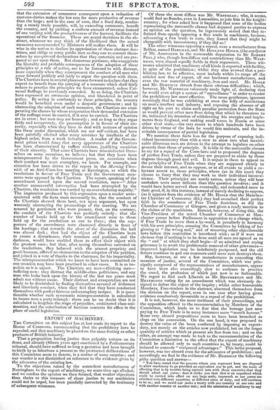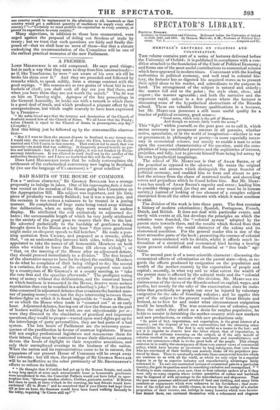EXPORT OF MACHINERY.
THE Committee on this subject has at last made its report to the House of Commons, recommending that the prohibitory laws be repealed, and that machinery be placed on the same footing as other. products of British industry.
That a proposition having justice thus palpably written on its front, and already (fifteen years ago) sanctioned by a Parliamentary tribunal, should have suffered so long a gestation and been brought to birth by so laborious a process as the protracted deliberations of this Committee seem to denote, is a matter of some surprise ; and our wonder is not diminished on reference to the evidence given by the advocates of the existing law. To the objections raised by the somnolent manufacturers of Nottingham to the export of machinery, we some time ago alluded; and we confess the opinion we then formed, that weaker objections than theirs to this measure of sheer justice to our machinists could not be urged, has been painfully corrected by the testimony of subsequent witnesses.
Of these the most diffuse was Mr. WESTHEAD ; who, it seems, could find no Sancho, even in Lancashire, to join him in his knight- errantry ; for when asked how it happened that none of the bodies representing the mercantile classes had deputed parties to express an opinion on the question, he ingenuously stated that they re- frained from openly opposing a free trade in machinery, because, advocating a free trade in corn, they feared that they might be chargeable with inconsistency if they did so ! The other witnesses opposing a repeal, were a manufacturer from Belfast, named HERDMAN and Mr. HOLLAND BOOLE, (the coadjutor of Mr. ASHWORTH in the memorable deputation to Sir ROBERT PEEL,) who, though less diffuse and contradictory than Mr. WEST-. HEAD, were almost equally feeble in their arguments. These wit- nesses admitted that machinery of all kinds is exported with facility, in spite of the prohibition ; whilst they also avowed that a pro- hibitory law, to be effective, must include within its range all the articles now free of export, all our hardware manufactures, and even the raw material of machinery, iron and steel. Mr. HOOLE and Mr. HERDMAN shrunk from these obvious difficulties ; which, however, Mr. WEsmsan valorously made light of, declaring that he would even adopt a system of " surveillance " in order to render the prohibitory law more effective. The same gentleman, ignorant seemingly that he was exhibiting at once the folly of restrictions on men's intellect and industry, and exposing the absence of all right on his part to claim such peculiar protection from the State as would prevent other men from doing that which he threatens to do, intimated his intention of withdrawing his energies and imple- ments from England, and making small wares in Russia or some other rival state,—the very resort to which hundreds have been driven by virtue of the laws he would fain maintain, and the in- evitable consequence of partial legislation.
We mention these facts less for the purpose of exposing indi- vidual inconsistency than with a view to show into what inextri- cable dilemmas men are driven in the attempt to legislate on other grounds than those of principle. It is idle in the mercantile classes to cry for a repeal of the Corn-laws and to propound the dogmas of perfect Free Trade, unless they are prepared to abide by those dogmas through good and evil. It is unjust in them to appeal to the principles of Free Trade when they are supposed clearly to favour their interest, and to oppose, or at all events to yield a re- luctant assent to, those principles, where (as in this case) they choose to fancy that they may work to their individual inconve- nience. Their principles are surely rotten, unless they will bear unshaken tests more delicate than this question involves; and it would have better served them eventually, and redounded more to their good, if, in this instance, instead of merely declining to oppose, (as it appears from the evidence of Mr. HooLE that the Manches- ter Chamber of Commerce did,) they had avouched their perfect faith in the soundness of Free Trade doctrines, as did the Chamber of Commerce at Glasgow, and given a ready sanction to the claims of the machinists. Instead, however, of doing this, the Vice-President of the noted Chamber of Commerce at Man- chester comes before Parliament in opposition to a change which, if Free Trade be more than a by-word, is peculiarly in harmony with his own principles, amusing the Committee by talking of be- ginnina. at " the wrong end," and of removing other objectionable laws before this restriction is interfered with ; as if it were not obvious that if nothing is to be done until all men are agreed as to the " end " at which they shall begin—if an admitted and crying grievance is to await the problematic removal of other grievances— improved legislation may be indefinitely postponed, and the old fetters continue to gall our commere until mere rust destroys them. Shy, however, as are a few manufactures in conceding this measure of justice, several of the Committee, which was prin- cipally composed Of the representatives of manufacturers, appear to have been also exceedingly slow to embrace in practice the creed, the profession of which just now is so fashionable. We regret to find such Liberals as Mr. BacerameroN and Mr. Haerucors voting for an amendment which was obviously de- signed to defeat the object of the inquiry ; whilst other honourable Members, Free-traders in the abstract, absented themselves from the division on the report, even in one case after having given evidence conclusively favourable to a repeal of the prohibition.
It is not, however, the mere tardiness of their proceedings, nor the opposition offered to the recommendation by Members of the Committee, which leads us to fear that the homage just now paying to Free Trade is in many instances mere "mouth honour." Some very absurd propositions seem to have been broached as clogs on the concession. On the one band, it was proposed to destroy the value of the boon conferred by imposing an export- duty, not merely on the articles now prohibited, but on the larger quantity of articles which at present are free from tax ; and on the other, an attempt was made to tack to the recommendation of the Committee a limitation to the effect that the export of machinery should be allowed only to such countries as, by treaty, could be induced to concede "reciprocal advantages." This latter proposal, however, was too absurd even for the advocates of prohibition ; and accordingly we find in the evidence of Mr. HERDMAN the following pithy question and answer- " Yon have stated that the persons whom you represent here are disposed to allow machinery to go provided an equivalent can be got, and the mode of effecting that is by treaties being eqtered into with those countries that they should admit our yarns: does it strike you that that is an expedient which could be carried into effect on any large scale, inasmuch as our yarns are admitted into different countries at different rates of duty, and will continue to be so; and we could not make a treaty with one country at one rate and with another coital's, at another rate; and the admission of machinery to any one country would be tantamount to the admission to all, inasmuch as that country would get a sufficient quantity of machinery to supply every other country ?"—" Certainly we must prohibit its exportation to every country, or permit its exportation to every country."
Many objections, in addition to those here enumerated, were urged against the proposal of doling out freedom of trade by treaty ; but we trust that such questions are fairly and finally dis- posed of—that we shall hear no more of them—but that a statute embodying the recommendation of the Committee will be one of the earliest practical measures of the new Parliament.



























 Previous page
Previous page